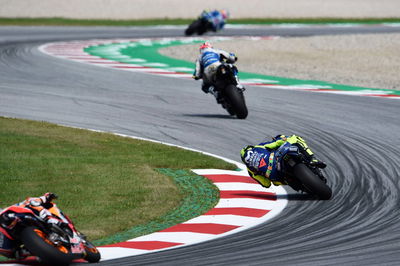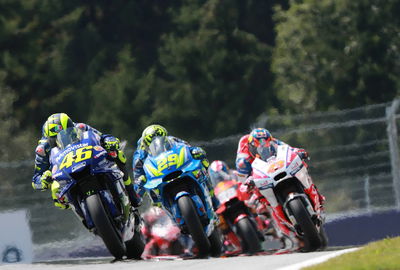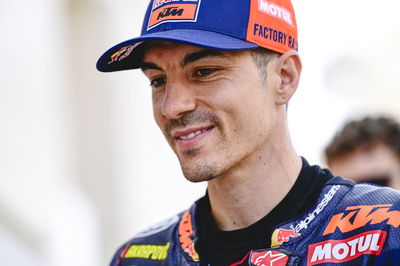Rossi: It's a combination of engine and electronics
Saturday's unprecedented public apology by Yamaha management to riders Valentino Rossi and Maverick Vinales caused debate and a little confusion within the MotoGP paddock.

Saturday's unprecedented public apology by Yamaha management to riders Valentino Rossi and Maverick Vinales caused debate and a little confusion within the MotoGP paddock.
The confusion, also expressed privately by senior management of rival teams, was why a factory that was leading the Teams' World Championship, second in the Riders' Championship and had one machine (the satellite bike of Johann Zarco) on the second row of the grid felt the need to present such an apology.
The reason given by Yamaha was that the 12th and 14th grid places for factory riders Maverick Vinales and Valentino Rossi warranted such action.
It was certainly a poor performance, Yamaha's worst as a factory team in the dry since Valencia 2007, but the same positions as last year's wet Motegi qualifying. Rossi has also qualified 10th or lower on two previous occasions this season alone, Vinales three times.
A more worrying statistic is Yamaha's 20 (now 21) race losing streak, their worst since 1998.
However, it wasn't mentioned at all by YZR-M1 Project Leader Kouji Tsuya, second-in-command among Yamaha MotoGP's Japanese management, who stood in front of the media to apologise for the qualifying result, citing "acceleration performance" and sensor problems for Vinales.
"We are struggling and have to say sorry to the riders."
Whether the apology was suggested by Tsuya himself, his boss (Yamaha Motor Racing General Manager Kouichi Tsuji), the Movistar Yamaha Communication staff or the riders remains unclear.
After Sunday's race, in which an upbeat Rossi recovered from 14th to sixth, the Italian was asked if he thought the apology had been necessary: "I'm not the one that has to decide. For me, it's more important that they improve the bike! This is the only important thing."
Rossi also laughed off questions about whether he has full confidence in Tsuji: "I cannot answer this. I work for Yamaha and my job is to try to make the maximum and especially give the indications to improve. And after that point, unfortunately it's not my job. They have to try."
Quizzed jokingly on if he would like to see (the long-retired) Masao Furusawa, who oversaw his spectacular early success at Yamaha, back in command, Rossi answered: "I don't think it's possible! For me we can improve with these guys. The important thing is to work in the right way. In the right areas."
'The right areas'
So what are 'the right areas' that Yamaha needs to work on?
Rossi has repeatedly stated that, for one year now, he has been warning Yamaha about the need to improve acceleration, through the electronics, to match Ducati and Honda.
In his apology Tsuya spoke of: "Acceleration performance, which means to adjust the power delivery more precisely."
The hard-acceleration zones of the Red Bull Ring circuit punished the M1's power delivery more than a flowing circuit, hence Rossi had been a frontrunner a week earlier at Brno before tyre wear, also thought to be related to the power delivery, kicked in late in the race.
But why does Rossi feel the acceleration problems are caused by the electronics, rather than the chassis or engine? How can he tell?
"For me, the chassis of our bike is good," Rossi answered, before offering some new information: "But I agree with you, it's not just the electronics, it's the engine.
"Because if you go on the track, Honda and Ducati change very, very much in the last year and a half and it is a combination between engine and electronics. It's difficult to understand the percentage of each, but that is the way."
Commenting on Yamaha's upcoming test at Misano, team director Massimo Meregalli said they would try "something for next year, that is not related to the electronics" adding "driveability, or power delivery, is very very important. And this is also where we are working for next year."
That could mean testing a revised engine design, since the rules prevent Yamaha changing its current engine until next year.
Even at Yamaha's worst circuit, starting from the fifth row and overtaking eight riders, Rossi was 14-seconds behind race winner Lorenzo after 28 laps, or half-a-second a lap.
"This is the reality now and for me it's the biggest difference in the last ten years. The difference [in the races] is very small," Rossi said.
"But we are the factory Yamaha. So we have to look at the factory Honda and factory Ducati. We have to compare with them, not with the other bikes and at this moment we are at a disadvantage."
'Maverick just needs a better bike'
Rossi's upbeat demeanour even when describing such problems was in stark contrast to team-mate Vinales, who had a face like thunder and barely uttered more than a few words to the press after his twelfth-place finish.
Why the difference?
"For me, it is a question of experience, because I pass through a lot of bad periods, more than Maverick, who is a lot younger than me. But is also character," Rossi said.
"But I'm sure if the bike made the step, Maverick can win the [next] race. So it's not that he is not able anymore to ride. He just needs a better bike and after he can be more competitive from the next practice for sure."
Rossi remains second in the world championship, but now 59 points from Marquez and 12 ahead of Lorenzo. Vinales has dropped one place to fourth in the standings, 72 points from Marquez heading to the British Grand Prix at Silverstone later this month.












